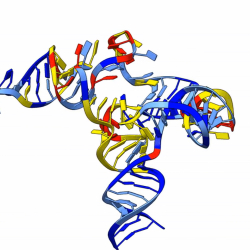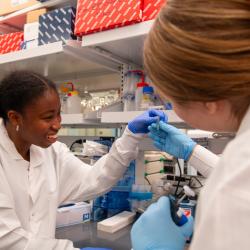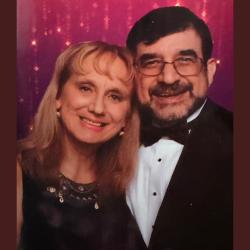Tipping Point to Turning Point
“I owe my education to a thief…sort of,” says Patrizia Barone, B.S. ’78, chemistry.
Born in Italy, Barone and her family immigrated to Uruguay when she was young, and they made a living selling fruits and vegetables. The middle of three children, Barone helped with the family business, where she developed sales skills at an early age. When Barone was 10, someone stole the family’s truck, which was used to transport the produce. At the time, Uruguay was going through political unrest and tough economic times, and members of her extended family had already moved to the U.S. “The theft of the truck was the tipping point for my family to decide to leave Uruguay a few years later,” Barone says.
The Barones packed up and moved to the U.S. in 1970, a move Barone says “created the opportunity for my success.” She eventually won a scholarship to attend the University of Maryland and later earned her Ph.D. in inorganic chemistry at Georgetown University.
She credits the support of her parents and others for helping her chart a remarkable path to several high-level corporate positions, logging more than 5 million air miles in the process. “My parents had to cut their educations short in Italy during World War II,” she says, “so they made sure their kids received an education, even if it was a struggle for them at times.”
Barone’s background helped her secure a job at Colgate-Palmolive after receiving her doctorate. Fluent in Italian, Barone was hired to develop detergent soaps for the Philippines, a position that required working closely with the research and development (R&D) laboratory in Italy. Her product development skills were honed in her next position with Bayer’s consumer products division in Chicago.
By age 32, Barone was named vice president of R&D at Reckitt Benckiser, where she led the North American R&D laboratory. Later, she moved to Sydney, Australia, to direct all product development activities for Australia, New Zealand, South and East Asia, Africa, and the Middle East. In 2000, she returned to the U.S. to lead the company’s global regulatory affairs organization.
In 2009, Barone joined Unilever and now represents the company on the board of the Alliance for Consumer Education and supports the Alliance’s program to prevent inhalant abuse. As Unilever’s regional vice president of regulatory affairs for North America and global foods and refreshment, Barone is the one helping others work toward success.
Well aware of the support she received throughout her career, Barone believes in giving back. She currently serves on the Department of Chemistry and Biochemistry’s Committee of Distinguished Advisors and chairs the advisory board of the Joint Institute for Food Safety and Applied Nutrition (JIFSAN).
In addition, she has created two scholarships in honor of her parents’ commitment to education: The Francesco Barone Scholarship for chemistry students in the College of Computer, Mathematical, and Natural Sciences, and the Rosina Barone JIFSAN Educational Fund in the College of Agriculture and Natural Resources.
“I was fortunate to receive scholarships and work-study employment during my years at Maryland,” Barone says. “That support allowed me to complete my education and was the springboard for my successful business career. I really want to pay it forward and give back to the University of Maryland to help students achieve their dreams.”
She adds, “One of the scholarship students found me on Facebook to tell me she just got her medical degree. She said now that she’s graduated, she can help others. That’s the most powerful thing.”
Writer: Ellen Ternes







